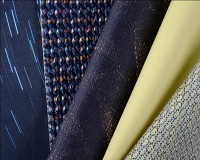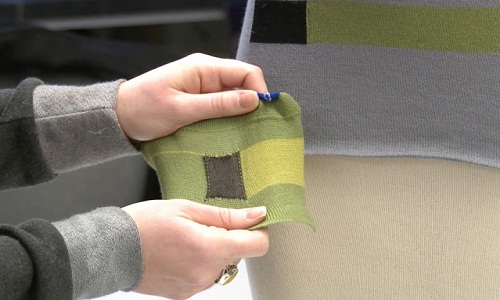"One of most striking examples is the development and widespread commercial usage of Unifi Inc.’s Repreve polyester fiber made from recycled post-consumer plastic water bottles. Two years ago, Unifi opened a bottle processing facility in Reidsville, N.C., to convert plastic bottles into polyester fiber and yarn, a year later it expanded its Repreve Recycling Center in Yadkinville, N.C. That gave the company an annual capacity to produce up to 60 million pounds of Repreve and other premier value-added products."
 Introduction of new environment-friendly materials ranging from recycled polyester, upcycled and regenerated fabrics, recycled cotton and cellulosic fibers have fastracked developments in fiber and fabrics. Some new innovations in fabrics that have taken the textile world by storm are:
Introduction of new environment-friendly materials ranging from recycled polyester, upcycled and regenerated fabrics, recycled cotton and cellulosic fibers have fastracked developments in fiber and fabrics. Some new innovations in fabrics that have taken the textile world by storm are:
From plastic to polyester
One of most striking examples is the development and widespread commercial usage of Unifi Inc.’s Repreve polyester fiber made from recycled post-consumer plastic water bottles. Two years ago, Unifi opened a bottle processing facility in Reidsville, N.C., to convert plastic bottles into polyester fiber and yarn, a year later it expanded its Repreve Recycling Center in Yadkinville, N.C. That gave the company an annual capacity to produce up to 60 million pounds of Repreve and other premier value-added products.
Last year, Unifi recycled over 10 billion plastic bottles and it now targets 20 billion recycled bottles by 2020, and 30 billion by 2022. The company has recycled 10 billion plastic bottles into fiber for new clothing, shoes, home goods and other consumer products. This fiber is used by many of the world’s leading brands including New Era, Levi’s, Target and Ford.
30 billion by 2022. The company has recycled 10 billion plastic bottles into fiber for new clothing, shoes, home goods and other consumer products. This fiber is used by many of the world’s leading brands including New Era, Levi’s, Target and Ford.
In January 2018, Unifi introduced its Champions of Sustainability Award, which is given to 25 brand and retail partners that used 10 million or more bottles, and 15 textile partners use 50 million or more bottles, through the use of Repreve fiber.
Insulation from fibres
Polartec recently introduced the upgraded Polartec Power Fill insulation made from 100 per cent post-consumer recycled (PCR) materials. It is a warm, lightweight package insulation that is hydrophobic, fast-drying and highly compressible. It’s made of proprietary hollow fibers bonded together through a process that reduces environmental impact, while simultaneously providing superior insulating properties, durability and hand. When the insulation was introduced a year ago, it featured 80 per cent recycled content. Polartec has now upcycled more than 1 billion post-consumer plastic bottles into hundreds of fabric styles and category-creating platforms.
Commercial fibres from recycled materials
Tricia Carey, Director of Global Business Development at Lenzing says, Tencel with Refibra technology has been adopted by six brands: Country Road, Patagonia, Our of the Woods, Reformation, Marco Polo and Mara Hoffman, and four more brands are expected to adopt the fiber, which substitutes traditional Tencel in the fabric construction. Refibra is made using the closed-loop Tencel lyocell production process and is the only commercially available fiber made from recycled cotton and wood pulp.
Lenzing has also expanded the production of its Ecovero brand of viscose fibers to its Lenzing Nanjing Fibers facility in Nanjing, China. Ecovero, a fiber derived from sustainable wood pulp from certified and controlled sources, has been produced in Lenzing’s Austrian facility since it was launched this past Fall, and since then demand has been strong, which prompted plans to increase production capabilities to accommodate it.
At the same time, Lenzing will expand its capacities of Tencel Luxe filament yarn that was first launched in the market last year. The company will invest up to $35 million in a pilot line at the Lenzing site in Austria.
Making repurposed fabrics
Increasing the exposure of sustainable fabrics is the mission of C.L.A.S.S., which recently launched e-commerce on its revamped website, classecohub.org to make the recycled, upcycled and repurposed fabrics from its consortium of mills available to small designers and students to purchase, with 50-meter maximums.
Among C.L.A.S.S.’s firms whose uptake of materials have been expanded include Ecotec by Marchi & Fildi’s collection made from already dyed, pre-consumer cotton clippings that come in 70 colors, and Cupro fiber from Bemberg by Asahi Kasei made from the transformation of cotton linter bio-utility waste converted through a traceable and transparent closed loop process. There’s also Re.VerSo, derived from wool and cashmere pre-consumer clippings supplied by a collaboration of five premium textile Italian producers, and Roica by Asahi Kasei, a sustainable elastane fiber that uses 50 percent pre-consumer materials.
Ricardo Silva, Head of Operations at Tintex Textiles, which uses sustainable materials including Tencel, organic cotton and BCI Cotton, and recycled materials in its Naturally Advanced fabric collection, said, “being part of C.L.A.S.S. since 2016 has helped us reach new customers.”












